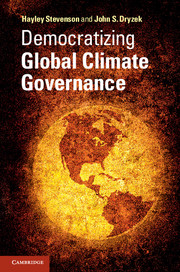Book contents
- Frontmatter
- Contents
- List of Tables
- Preface
- Acknowledgments
- List of Acronyms
- 1 The challenge of global climate governance
- 2 Global climate governance as a deliberative system
- 3 Governance with and without institutionalized authority
- 4 Authoritative global governance
- 5 Emerging centers of networked authority
- 6 Transmitting public concerns in the deliberative system
- 7 Accountability
- 8 Improving the global deliberative system
- 9 Conclusion
- References
- Index
8 - Improving the global deliberative system
Published online by Cambridge University Press: 05 June 2014
- Frontmatter
- Contents
- List of Tables
- Preface
- Acknowledgments
- List of Acronyms
- 1 The challenge of global climate governance
- 2 Global climate governance as a deliberative system
- 3 Governance with and without institutionalized authority
- 4 Authoritative global governance
- 5 Emerging centers of networked authority
- 6 Transmitting public concerns in the deliberative system
- 7 Accountability
- 8 Improving the global deliberative system
- 9 Conclusion
- References
- Index
Summary
We turn now from evaluation to prescription, though our prescriptions are built upon the analysis and evaluation carried out in the preceding chapters. There is no shortage of reform agendas when it comes to the global governance of climate change, so we enter a well-populated field, though our preoccupations are very different from many of those offered by others. Most existing proposals stem from frustration with the glacial progress of the multilateral negotiations, and seek either to somehow move them along or to find an alternative to them. Not all proposals are deliberative in spirit – unsurprisingly, because their authors do not necessarily have any more than a hazy understanding of deliberative democracy, still less any idea that it might apply to global governance. We will endeavor to connect what we propose to existing reform agendas, be it to reject them, endorse them, or modify them. We do not claim that an improved deliberative system is the sine qua non of effective climate governance, but for all the reasons that justify deliberative democracy with which we began in Chapter 2, it could go a long way to help. We organize our discussion according to the elements of a deliberative system as sketched in Chapter 2, though some proposals resist easy pigeonholing. Thus we begin with public space, moving to empowered space, transmission, and accountability. We save a discussion of meta-deliberation for the final chapter.
- Type
- Chapter
- Information
- Democratizing Global Climate Governance , pp. 181 - 208Publisher: Cambridge University PressPrint publication year: 2014

